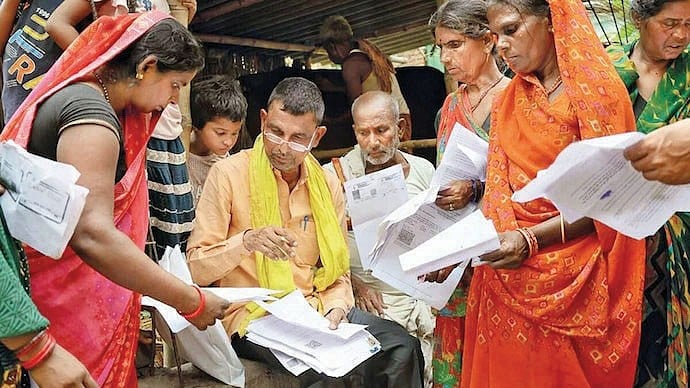POLITICS
EC to launch second phase of SIR across 12 states and UTs from today
The extensive operation, covering nearly 51 crore voters, follows the recent revision in Bihar that saw over 68 lakh names removed after verification

The Election Commission of India (ECI) will begin the second phase of the Special Intensive Revision (SIR) exercise today, aiming to clean up and update the electoral rolls across nine states and three Union Territories (UTs). The extensive operation, covering nearly 51 crore voters, follows the recent revision in Bihar that saw over 68 lakh names removed after verification.
The latest SIR will be conducted in Tamil Nadu, Kerala, West Bengal, Uttar Pradesh, Madhya Pradesh, Rajasthan, Chhattisgarh, Goa, Gujarat, Puducherry, Andaman and Nicobar Islands, and Lakshadweep. Among these, Tamil Nadu, Kerala, West Bengal and Puducherry are set to hold Assembly elections in 2026.
The enumeration phase of SIR 2.0 begins today and will continue until 4 December. The draft electoral rolls will be published on 9 December, and citizens will have until 8 January 2026 to file claims and objections. Hearings and verifications are expected to conclude by 31 January 2026, with the final rolls scheduled for publication on 7 February 2026.
Prior to this phase, the Election Commission completed an extensive pre-mapping process, matching the current electoral rolls with those from 2002–04, when the last SIR was conducted in most participating states and UTs.
This is the ninth Special Intensive Revision exercise since independence, with the previous one carried out between 2002 and 2004. For each state, the last SIR list will serve as the cut-off point — as was the case in Bihar, where the 2003 voter roll was used for the recent revision.
The principal objective of the Special Intensive Revision is to identify and remove ineligible voters, including illegal migrants, by verifying their place of birth. The exercise assumes added significance amid ongoing crackdowns on illegal migrants from Bangladesh and Myanmar in several states, particularly West Bengal, where the ruling Trinamool Congress has objected to the voter list verification process.
Chief Election Commissioner Gyanesh Kumar described SIR 2.0 as a “detailed, people-centric exercise” led by Booth Level Officers (BLOs), who will visit every household thrice to verify voter details.
BLOs will assist citizens in filling out enumeration forms and collect declarations from new voters applying for inclusion. These forms will then be submitted to Electoral Registration Officers (EROs) or Assistant EROs for further scrutiny.
Published: undefined
If a form is not returned, the BLO will determine the reason—such as death, duplication or migration, after consulting neighbours and recording findings. Only those who submit valid enumeration forms will be included in the draft rolls.
Once the draft lists are published, EROs will issue notices to individuals whose details could not be linked to earlier records, ensuring that only eligible electors remain on the rolls.
To maintain inclusivity, the ECI plans to deploy volunteers to assist senior citizens, persons with disabilities, the sick, and other vulnerable groups, ensuring they are not inconvenienced during the process.
“The aim is to ensure that no eligible voter is left out and no ineligible name remains on the rolls,” Kumar stated.
Based on lessons from Bihar’s SIR earlier this year, the poll body has updated its procedural rules. Voter lists published post-SIR in Bihar and Aadhaar cards have now been added to the list of indicative documents required for verification in the 12 participating states and UTs.
Importantly, electors will not need to submit documents at the enumeration stage. Only those whose names cannot be linked with previous SIR records will be required to furnish documents once served a notice by the ERO.
Bihar’s final voter list, published on 30 September, contains around 7.42 crore names. The state will hold elections in two phases on 6 and 11 November, with results to be declared on 14 November.
The state of Assam, which also goes to the polls in 2026, will not be included in this phase of the SIR. A separate revision will be announced later, as a Supreme Court-monitored exercise to verify citizenship is already underway there.
“Under the Citizenship Act, Assam has specific provisions, and the Supreme Court-supervised citizenship verification is nearing completion. Therefore, a separate SIR will be conducted for the state,” the Chief Election Commissioner clarified on 27 October.
Ahead of SIR 2.0’s commencement, the Tamil Nadu government filed a petition in the Supreme Court challenging the exercise. Chief Minister M.K. Stalin has accused the Election Commission of attempting to exclude “genuine voters” ahead of the 2026 state elections.
Similar concerns were raised earlier during Bihar’s SIR, with political parties alleging that the process risked disenfranchising large numbers of eligible citizens due to documentary requirements. The Election Commission, however, defended the initiative in the Supreme Court, assuring that no legitimate voter would be omitted from the rolls.
Published: undefined
Follow us on: Facebook, Twitter, Google News, Instagram
Join our official telegram channel (@nationalherald) and stay updated with the latest headlines
Published: undefined